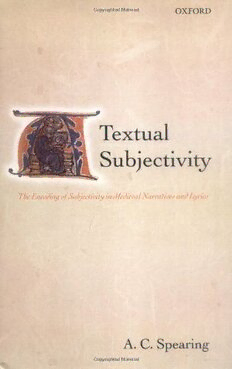
Textual Subjectivity: The Encoding of Subjectivity in Medieval Narratives and Lyrics PDF
282 Pages·2005·1.459 MB·English
Most books are stored in the elastic cloud where traffic is expensive. For this reason, we have a limit on daily download.
Preview Textual Subjectivity: The Encoding of Subjectivity in Medieval Narratives and Lyrics
Description:
This book investigates how subjectivity is encoded in the texts of a wide variety of medieval narratives and lyrics--not how they express the subjectivity of individuals, but how subjectivity, escaping the bounds of individuality, is incorporated in the linguistic fabric of their texts. Most of the poems discussed are in English, and the book includes analyses of Chaucer's Troilus and Criseyde, Man of Law's Tale, and Complaint Unto Pity, the works of the Pearl poet, Havelok the Dane, the lyric sequence attributed to Charles of Orleans (the earliest such sequence in English), and many anonymous poems. It also devotes sections to Ovid's Heroides and to poems by the troubadour Bernart de Ventadorn. For the first time, it brings to bear on medieval narratives and lyrics a body of theory which denies the supposed necessity for literary texts to have narrators or "speakers," and in doing so reveals the implausibilities into which a dogmatic assumption of this necessity has led much of the last century's criticism.
See more
The list of books you might like
Most books are stored in the elastic cloud where traffic is expensive. For this reason, we have a limit on daily download.
